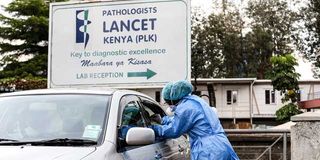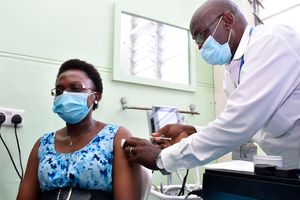New study warns of antibiotics resistance in Covid-19 patients

A health worker at Lancet Kenya collects samples for testing Covid-19 from a motorist on April 22, 2020.
Patients with Covid-19 are more likely to develop resistance to available antibiotics, a new study shows.
The study published in the scientific journal The Lancet shows that more than half of the critically ill patients in Intensive Care Units (ICU) are more susceptible to acquiring pathogens that are resistant to available antibiotics compared to those in the general population.
The research explains that since ICU patients use invasive forms of therapy such as mechanical ventilators, they are more likely to get diseases acquired from hospitals which need antibiotics for treatment that in turn become resistant strains.
The Centres for Disease Control and Prevention show that in the first year of the pandemic, about 30,000 people died from antimicrobial-resistance infections. Out of that number, about 40 per cent of them got the infection while in hospital.
This phenomenon is called Antimicrobial Resistance (AMR), one which the World Health Organization ranks one of the top 10 health threats facing humanity.
A person is said to have AMR when they have bacteria, viruses, fungi or parasites that have evolved in a way that should one be diagnosed with an infection caused by them, available medicines will not be able to treat the disease.
“Antibiotic therapy should not be given as standard unless a bacterial infection is strongly suspected. In patients admitted to ICU, although co-infections are still infrequent, the risk of bacterial secondary infections is high, and therefore a careful risk–benefit assessment informed by clinical judgment, patient factors, and local epidemiology is advised before initiation of antibiotics,” warned the researchers.
The study shows that about 10 types of bacteria acquired after Covid-19 infections are likely to be resistant to antibiotics.
The highly resistant bacteria Staphylococcus aureus — one that mostly affects the skin and may lead to boils and abscesses — had a prevalence of about 40 per cent in the patients.
The list of bacteria identified includes those that the WHO lists as critical to public health and that scientists should come up with new ways to treat them.
“We found substantial prevalence of antimicrobial resistance for several WHO critical pathogens, including carbapenem-resistant Acinetobacter baumannii and carbapenem-resistant Enterobacterales,” showed the study.
“The high prevalence of resistance, combined with the high prevalence of these organisms in COVID-19 secondary infections, highlights the urgency of antimicrobial stewardship and the development of new therapeutic agents,” it added.
Secondary infections are those that are acquired beside the main one, like those that the study says are developed in the hospital.
Low and middle-income countries
People living in low and middle-income countries like Kenya were 10 times more likely to be resistant to antimicrobials compared to those coming from richer countries.
“Low-income and middle-income countries face unique challenges including a high burden of infectious diseases and low access to—and capacity and resources for—diagnostics and surveillance. Our findings highlight the importance of continuous investments in building robust and sustainable systems to detect and monitor antimicrobial resistance and to strengthen capacity for antimicrobial stewardship and infection prevention and control in these settings,” said the researchers.
Other factors such as patients with diabetes who were critically ill with Covid-19 also contributed to antimicrobial resistance.
These findings were obtained from an analysis of about 148 studies of 362 976 patients. The researchers say that preliminary data already shows that the pandemic may have exacerbated antimicrobial resistance.
“Our findings provide an impetus to further assess antimicrobial resistance in patients with COVID-19 and emphasise the need for detailed surveillance and opportunities to prevent resistance. Furthermore, our findings have particular relevance to attempts to inform clinical management policies and guidance, quantify the global burden of antimicrobial resistance, and to explorations of how the COVID-19 pandemic might affect these estimates,” suggest the researchers.





